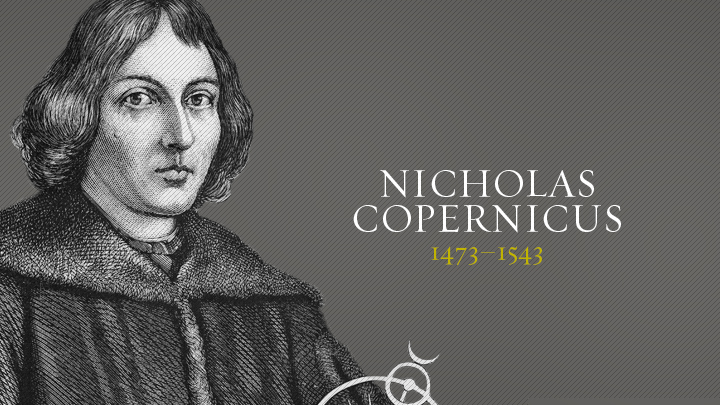"[It is my] loving duty to seek the truth in all things, in so far as God has granted that to human reason."
"The two great turning points of the Reformation age, the Lutheran and the Copernican, seem to have brought mankind nothing but humiliation," wrote historian Heiko Oberman. "First man is robbed of his power over himself, and then he is pushed to the periphery of creation."
In contrast to Luther, however, Nicholas Copernicus was not one to make bold, public gesture; instead he spent his life in relative quiet, hesitant to publish his revolutionary views until his very last days. And yet Copernicus, as much as Luther, revolutionized how Europeans thought of themselves, their world, and their God.
Timeline |
|
|
1453 |
Nicolas of Cusa invents concave lens |
|
1456 |
Gutenberg produces first printed Bible |
|
1472 |
Johannes Regiomontanus observes Halley's comet |
|
1473 |
Nicholas Copernicus born |
|
1543 |
Nicholas Copernicus dies |
|
1545 |
Council of Trent begins |
World-class scholar
Copernicus was born in Torun, in eastern Poland, where his father was an influential businessman. Copernicus studied first at the University of Cracow, where he first took an interest in astronomy ("most beautiful and most worth knowing," he said), and then moved on to the University of Bologna to study Greek, mathematics, and more astronomy. At Bologna he fell in with scholars who agreed that Aristotle's cosmology was too inelegant—in Copernicus's words "no sure scheme for the movements of the machinery of the world which has been built for us by the Best and Most Orderly Workman of all."
After a brief visit home to be installed as canon (a permanent salaried staff position in a cathedral), he returned to Italy to complete his doctorate of law and to study medicine at the University of Padua. In 1506 he returned to Poland, and though only in his early thirties, he was said to have mastered all the knowledge of the day in mathematics, astronomy, medicine, and theology.
Astronomy as hobby
As a canon, he served as confidant and secretary to his uncle, the bishop, and as a physician to the poor. Though weighed down with administrative and medical duties, he found time to formulate his ideas on astronomy into a booklet he called his Little Commentary (1512). He was not treading popular ground, since medieval theologians had nearly made it a point of orthodoxy that the earth was the center of the solar system, proof that humankind was the center of God's attention. Copernicus knew that "as soon as certain people learn that … I attribute certain motions to the terrestrial globe [that is, that the earth moved around the sun], they will immediately shout to have me and my opinion hooted off the stage…." Still he considered it his "loving duty to seek the truth in all things, in so far as God has granted that to human reason."
In 1514 the pope asked if he could help revise the calendar. Copernicus replied that "the magnitude of the years and months … had not yet been measured with sufficient accuracy." But he took this as a personal challenge and turned his tower apartments into a night observatory. His daylight hours were spent on his official duties with the sick, in administration, and guiding the diocese through a war between the Teutonic Knights and the King of Poland.
Eventually Copernicus passed on his official responsibilities to younger men and settled into semi-retirement in his private observatory. This might have been the end of a full life had not a young Lutheran mathematician and disciple visited the old astronomer. Copernicus, invigorated by the encounter, finally agreed to publish theories he'd been developing for a lifetime. In his On the Revolutions of the Celestial Spheres (1543), he appealed to the pope to judge between him and the "idle talkers" who "although wholly ignorant of mathematics … distorting the sense of some passage in Holy Writ to suit their purpose … attack my work."
His work passed into the hands of the less courageous. His editor inserted an anonymous preface indicating that the work was a mathematical construct to better explain the motions of the planets, not a description of how the solar system actually worked.
Copernicus's ideas (though anticipated by some ancient astronomers, he discovered in his studies) were too much for contemporaries; even a revolutionary like Martin Luther found it impossible to believe the sun, not the earth, anchored the solar system.
It wasn't until Galileo (1564–1642) that Copernicus's ideas were seen for what they were—a revolution in how humankind conceived of itself. For some this implied that de-centered earth was an insignificant speck to a distant God; others, though, marveled that the creator of a now infinite universe would lavish such attention on a planet that seemed to stand at the periphery of all creation.










